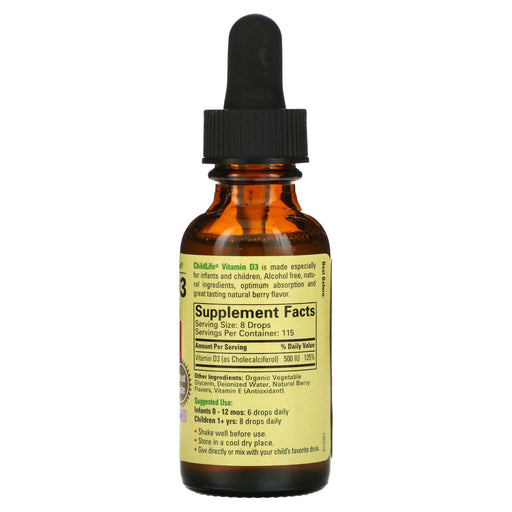
Nurturing Your Child's Health with the Sunshine Vitamin
As a parent, you strive to provide your child with the essential nutrients they need for healthy growth and development. One vital nutrient that plays a crucial role in supporting your child's bone health, immune function, and overall well-being is vitamin D. Children's vitamin D supplements can help ensure your child receives an adequate supply of this important vitamin, especially when sunlight exposure or dietary sources are limited.
The Importance of Vitamin D in a Child's Health
Vitamin D, often referred to as the "sunshine vitamin," is a fat-soluble vitamin that offers numerous health benefits for children. Some of the key functions of vitamin D include:
- Bone Health: Vitamin D is essential for the absorption and utilization of calcium and phosphorus, two minerals that are crucial for building and maintaining strong bones and teeth.
- Immune System Support: Vitamin D helps regulate the immune system and has been shown to play a role in protecting against infections and autoimmune disorders.
- Muscle Function: Adequate vitamin D levels are necessary for proper muscle development and function, helping to prevent muscle weakness and promote overall physical performance.
- Brain Development: Recent research suggests that vitamin D may play a role in brain development and cognitive function, particularly during early childhood.
- Mood Regulation: Some studies have linked vitamin D deficiency to an increased risk of depression and other mood disorders in children and adults.
While the body can produce vitamin D when the skin is exposed to sunlight, many children may not get enough sun exposure due to factors like indoor lifestyles, sunscreen use, or living in northern latitudes. Additionally, few foods naturally contain significant amounts of vitamin D, making it challenging for children to meet their daily requirements through diet alone. This is where children's vitamin D supplements can help bridge the gap.
Benefits of Children's Vitamin D Supplements
Incorporating a high-quality children's vitamin D supplement into your child's daily routine can offer several potential benefits, including:
- Ensuring Adequate Intake: Vitamin D supplements provide a reliable source of this essential nutrient, helping to prevent deficiency and support optimal health.
- Supporting Bone Growth: Regular vitamin D supplementation can help ensure your child's bones receive the necessary nutrients for proper growth and development.
- Boosting Immune Function: Adequate vitamin D levels can help support your child's immune system, reducing the risk and severity of infections and illnesses.
- Promoting Muscle Strength: Vitamin D supplements can help support muscle function and strength, promoting overall physical performance and reducing the risk of falls and fractures.
- Potential Cognitive Benefits: By supporting brain development and function, vitamin D supplements may contribute to your child's cognitive health and academic performance.
Choosing the Best Children's Vitamin D Supplement
When selecting a vitamin D supplement for your child, it's essential to choose a high-quality product from a trusted brand. Consider the following factors:
- Appropriate Dosage: Look for supplements that provide an appropriate daily dose of vitamin D for your child's age and needs, typically ranging from 400-1000 IU per day.
- Quality and Purity: Choose supplements manufactured in GMP-certified facilities, free from artificial additives and contaminants, and third-party tested for purity and potency.
- Bioavailable Forms: Opt for supplements that contain vitamin D3 (cholecalciferol), which is the most bioavailable and effective form of vitamin D.
- Child-Friendly Formulations: Consider supplements with easy-to-take forms, such as chewable tablets or liquid drops, to ensure your child will take them consistently.
- Combination Formulas: Some children's vitamin D supplements may include other bone-supportive nutrients, such as calcium or vitamin K2, for added benefits.
Tips for Incorporating Vitamin D Supplements into Your Child's Routine
To maximize the benefits of children's vitamin D supplements and support your child's overall health, consider the following tips:
- Pair with a Balanced Diet: While supplements can help fill nutritional gaps, they should be used in conjunction with a balanced diet that includes vitamin D-rich foods, such as fatty fish, egg yolks, and fortified dairy products.
- Encourage Outdoor Play: Promote safe sun exposure by encouraging your child to spend time outdoors during the day, particularly during the midday hours when vitamin D production is most efficient.
- Follow Dosage Instructions: Always adhere to the recommended dosage on the product label, and consult with your child's pediatrician before starting any new supplement regimen.
- Monitor Vitamin D Levels: Consider having your child's vitamin D levels tested periodically to ensure they are maintaining adequate levels and adjust supplementation as needed.
Support Your Child's Health with Quality Vitamin D Supplements
By incorporating a high-quality children's vitamin D supplement into your child's daily routine, you can help support their bone health, immune function, and overall well-being. With a commitment to purity, potency, and your child's individual needs, Health Orchard offers a range of vitamin D supplements designed to provide the essential nutrition your child needs to thrive.
Explore our selection of children's vitamin D supplements and witness the power of this crucial nutrient in supporting your child's health. With the right tools and a proactive approach, you can help your child build a strong foundation for a lifetime of wellness.
Frequently Asked Questions about Children's Vitamin D
1. How much vitamin D should a child take?
The recommended daily allowance (RDA) of vitamin D for children varies by age:
- Birth to 12 months: 10 mcg (400 IU)
- 1-18 years: 15 mcg (600 IU)
These amounts can be obtained through a combination of:
- Sun exposure (about 10-30 minutes of midday sunlight, several times a week)
- Fortified foods (milk, cereals, orange juice)
- Fatty fish (salmon, tuna, mackerel)
- Egg yolks
- Supplements (if recommended by a pediatrician)
If supplementation is necessary, consult a pediatrician for personalized dosage recommendations.
2. What is the best vitamin D to take for kids?
The best vitamin D supplement for kids is one that is age-appropriate, easy to take, and made by a reputable company. Some top-rated options include:
- Carlson Labs Baby's Super Daily D3 Drops
- Nordic Naturals Baby's Vitamin D3
- Zarbee's Naturals Baby Vitamin D
- Raise Them Well Vitamin D3 Gummies for Kids
- NOW Foods Kid Vits Vitamin D3 Gummies
When choosing a vitamin D supplement, look for:
- Vitamin D3 (cholecalciferol) form, which is more effective than D2 (ergocalciferol)
- Age-appropriate dosages
- Quality ingredients and third-party testing for purity and potency
- Reputable manufacturers
Consult a pediatrician for personalized recommendations and to ensure proper dosage and safety for your child.
3. What are the symptoms of vitamin D deficiency in children?
Symptoms of vitamin D deficiency in children may include:
- Rickets: A condition characterized by soft, weak, and deformed bones
- Delayed growth and development
- Bone pain or tenderness
- Muscle weakness
- Fractures
- Dental problems (delayed tooth eruption, tooth decay)
- Frequent infections
- Fatigue
- Irritability
- In severe cases, hypocalcemic seizures
It's important to note that many children with vitamin D deficiency may not show apparent symptoms. Regular check-ups with a pediatrician and screening for vitamin D levels can help identify and address deficiencies early on.
4. How can I give my child vitamin D?
You can ensure your child gets enough vitamin D through several means:
- Sun exposure: Encourage your child to spend 10-30 minutes in midday sunlight, several times a week. Be mindful of sun protection to prevent skin damage.
- Diet: Include vitamin D-rich foods such as fatty fish (salmon, tuna, mackerel), egg yolks, and fortified foods (milk, cereals, orange juice).
- Supplements: If recommended by a pediatrician, give your child age-appropriate vitamin D supplements, such as drops, chewables, or gummies.
- Breastfeeding: If you are exclusively breastfeeding, your infant may need vitamin D supplementation, as breast milk alone may not provide sufficient amounts. Consult your pediatrician for guidance.
Remember to consult a pediatrician for personalized recommendations and to ensure proper dosage and safety for your child.
5. When should children start taking vitamin D?
The American Academy of Pediatrics recommends that infants receive 400 IU (10 mcg) of vitamin D per day, starting shortly after birth.
For older children, the need for vitamin D supplementation depends on their diet and sun exposure:
- Children who consume adequate amounts of vitamin D-fortified foods and get regular sun exposure may not need supplementation.
- Children with limited sun exposure, restricted diets, or certain medical conditions may require supplementation.
Regular check-ups with a pediatrician can help determine if and when vitamin D supplementation is necessary for your child.
6. Do kids need vitamin D supplements?
Some kids may need vitamin D supplements, especially if they:
- Are exclusively or partially breastfed
- Have limited sun exposure due to factors like living in northern latitudes, using sunscreen, or spending most of their time indoors
- Follow a vegan or vegetarian diet
- Have certain medical conditions that affect vitamin D absorption (e.g., celiac disease, cystic fibrosis)
- Are obese or taking medications that interfere with vitamin D metabolism
However, children who consume adequate amounts of vitamin D-fortified foods and get regular sun exposure may not need supplementation. Consult a pediatrician to determine if vitamin D supplements are necessary for your child and to ensure proper dosage and safety.










